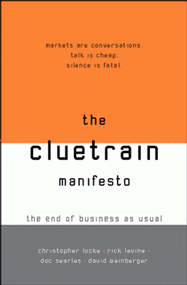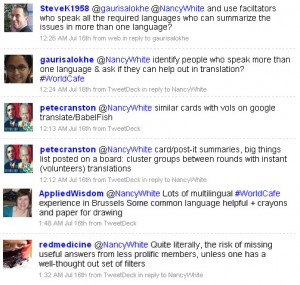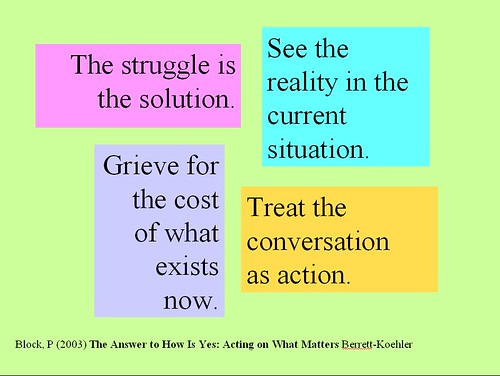 Rebecca Leaman had a blog post today the reminded me of unfinished business. Do you have any of that? Projects started, but never finished?
Rebecca Leaman had a blog post today the reminded me of unfinished business. Do you have any of that? Projects started, but never finished?
Well, this unfinished business feels worth revisiting this week to celebrate the 10 year anniversary of the publication of The Cluetrain Manifesto by Rick Levine, Christopher Locke, Doc Searls, and David Weinberger. Great book! I was wildly inspired by their 95 theses, but a bit turned off by the business focus, as my attention is often on the organizational and non profit sector. So I thought, HEY, why don’t I write some non profit annotations for each of the theses. Wow, never finished. Big surprise. But the theme crept into my writing and work many times over.
Today Rebecca, who also cares about non profits and NGOs, found them and wrote:
Back in 1999, Nancy White checked in on The Cluetrain from a non-profit perspective, and saw that the conversation needed to go further and deeper:
People are tired of being inundated with selling messages. They have become cynical about them, which is frightening for those trying to deliver health education and community building messages. TV campaigns and government pamphlets are treated with suspicion and disdain. And they are responding to word of mouth more than ever.
This has significant ramifications for the nonprofit or “third sector.” For the few blue ribbon organizations that are well-connected to the big business circuit, life is sweet and the cash flows. But for the majority, especially the smaller and community based organizations, life has changed and it is time to get a clue.
An emerging trend is actually a throwback to a familiar model that has been embraced by unions, religions and, gasp, even cults. Develop a constituency. Serve them. Listen to them. Work with them, don’t have them work for you. Give them power and control and then fasten your seatbelts because all the rules change.
White’s response to The Cluetrain Manifesto was never completed, and I can certainly see why. The whole book is a bit of a wild ride into Utopia, some of the points so prophetic that today we take the power of online conversations and communities almost for granted; others so outright bizarre that critics can’t be faulted for laughing in their sleeve.
Still, like the wide-eyed idealism of the hippie era, The Cluetrain has left an indelible mark. The Internet may be led today by bright young adults who were still preoccupied with acne and prom dresses when The Cluetrain first rolled through, but the online world they grew up into is a fair reflection of that original call to action.
I always enjoy a wild ride into Utopia. But clearly completion of that ride never happened. I guess I just started living into many of the ideas of the Cluetrain gang. As I reread them, one thing I really notice is the negativity of many of them. A fun project would be to rewrite them in an appreciative way, recognizing the potential instead of berating.
Anyway…. today, in honor of the anniversary, I want to pick two of the theses and dust them off. After all, the Cluetrain guys are about to publish their 10th Anniversary version. My informal contribution to the anniversary, which is being more formally recognized here. My interpretation is from the international development/NGO perspective. Each offering will have an appreciative reframe. Be forewarned.
61. (original) Sadly, the part of the company a networked market wants to talk to is usually hidden behind a smokescreen of hucksterism, of language that rings false—and often is.
Reframe: Your staff hold knowledge and speak more of my language than your formal spokespeople and reports. By giving us access to each other, we will learn and do more together. Thanks for removing the smokescreen.
International development is often its own worst enemy because it often “officially” speaks in a language divorced from the experience both of the people the are intending to “help” (patronizing, assuming the “helpers” have the answer, out of context of the actual system, etc.). and instead pitched at donors and investors. Opening up data, reporting mechanisms and utilizing social networks to connect people to get information and learn from each other is now possible. It takes a risk – to risk saying something inpolitic, to risk sharing of unvetted data. But the reward is far higher than the risk.
79. (original) We want you to drop your trip, come out of your neurotic self-involvement, join the party.
Reframe: We who you are “serving” welcome you as partners and colleagues. We know a great deal, and we want to share that with you and learn/apply what you know. Come join us.
International development is often driven by ideas of donors. There are a lot of great ideas – not just from donors, but from people who want to change and improve their own lives. Developing entrepreneurial partnerships, financing mechanisms that are networked, have roots in local systems and incentives challenge traditional development paradigms, but may be a new path to sustainable and scalable development. (I learned this from a dear colleague who is trying to help her organizations see this vision!)
Rebecca also reminds us:
You can still read The Cluetrain Manifesto online (free) at Cluetrain.com, and it’s worth doing so if only for a nostalgic sense of the breathless excitement that ushered in the first whispers of Web 2.0. And if you find it a bit heavy-going, Michael Mace and Rubincon Consulting have boiled down the best of The Cluetrain message into Ten Commandments for Communicating with People Online, which is both easier to absorb than the orginal, and arguably more readily applied by the kinds of slow-moving organizations that The Cluetrain aimed to reach, ten years ago today.
 Last month I was facilitating a World Cafe session for an international development organization in Rome (IFAD). The participants spoke French, English, Portuguese and Spanish. Some were monolingual, others were multilingual. For plenary sessions we had simultaneous translation, but for breakouts and World Cafe conversations, we had to rely on each other. Multilingual folks tried to fan out across the groups.
Last month I was facilitating a World Cafe session for an international development organization in Rome (IFAD). The participants spoke French, English, Portuguese and Spanish. Some were monolingual, others were multilingual. For plenary sessions we had simultaneous translation, but for breakouts and World Cafe conversations, we had to rely on each other. Multilingual folks tried to fan out across the groups.
 Rebecca Leaman had a
Rebecca Leaman had a  My March post on SharePoint
My March post on SharePoint